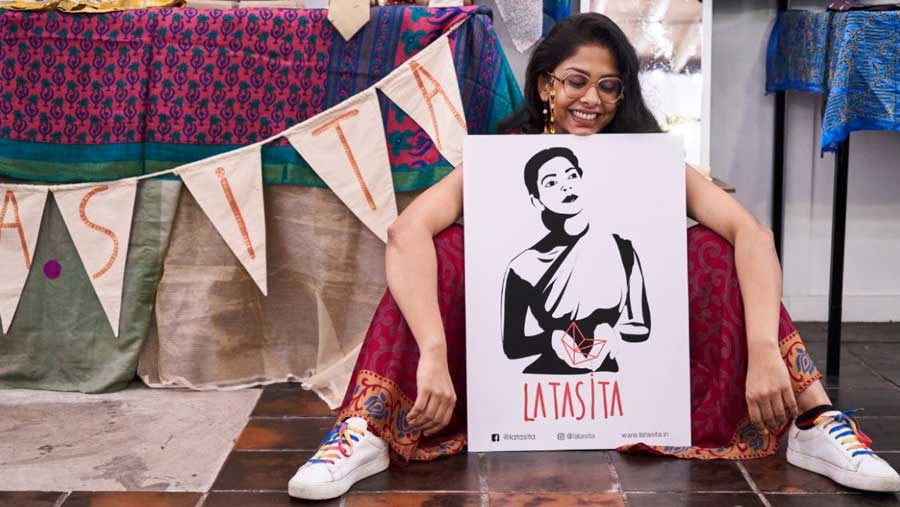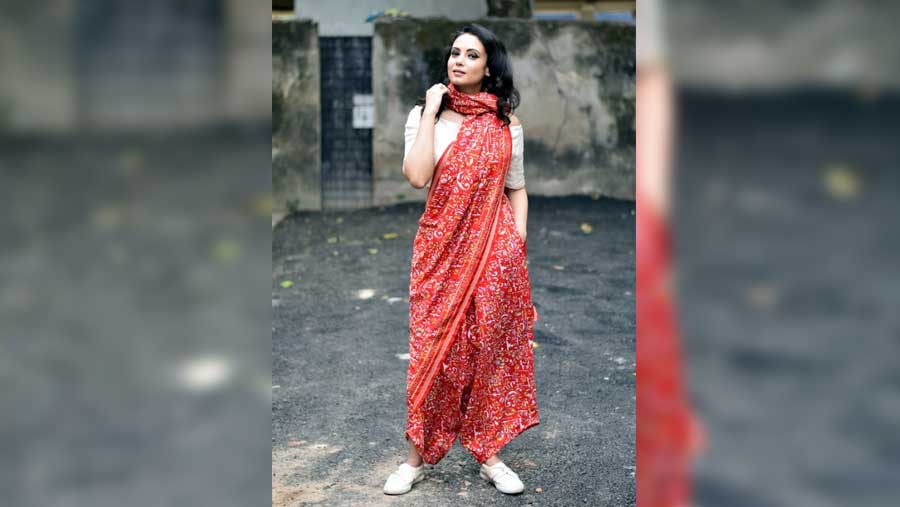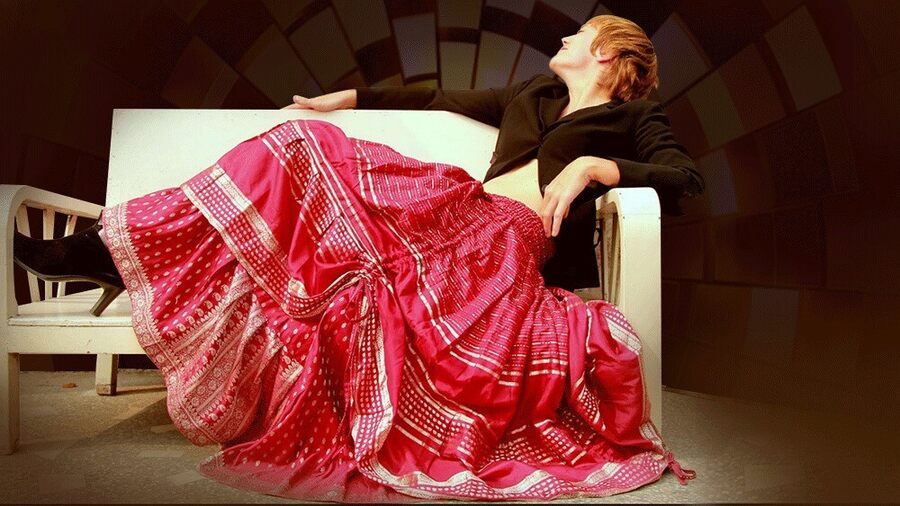The concept of reusing sarees is not new. Our grandmothers have been turning them into kanthas and kurtas. But design-wise, it’s usually for the same couple of things. It’s not considered stylish or high design, or seen as ‘occasion wear’. I wanted to change this. I wanted to get people to see upcycling as a serious option, uplifting that unused piece of cloth to a gorgeous piece of bespoke fashion. LataSita is the product of this train of thought.

Meghna Nayak at a LataSita exhibition in Camden, London
I’ve always loved textiles and have been customising my clothes since I was a teenager – adding pockets, changing shapes, hand-altering pieces, all of which gave me great pleasure. However, I thought of the fashion industry as being frivolous and wasteful, and wished no part in it. I had become uncomfortably aware of the cruel practices the sweatshops supplying so many of my (former) favourite brands were guilty of. In 2010, I was horrified to learn that fashion was one of the largest polluters on Earth, second only to Big Oil. This really got to me. I came back to Kolkata after almost seven years in England, and realised that I could enter the fashion supply chain and try, firsthand, to do things differently. I could experience the challenges of running an ethical business.
I considered various sustainable textiles as I wanted an option that created the least impact and waste. Then, my mum opened her wardrobe.
It was more than I could have imagined. I found beautiful pieces belonging to my grandmother, whom I had never met. Her sarees have been carefully preserved for decades. It felt like an instant, intimate connection to her, a hotline to history.
My mum is a pretty frugal sort, rarely buying anything at all. If she had so many, I was excited about the millions of such sarees tucked away in wardrobes across the country, being worn less and less. Even brand-new sarees lie unused in wardrobes, or are rarely worn. I could not allow this treasure trove of fabric – our textile heritage – to decompose unseen and unused even as more and more cloth was being created to satisfy booming demand.
I had an ‘aha’ moment of sorts back in 2012. I found it interesting that while the average woman loved fast-fashion, the same person was also storing sarees for years, even decades. This indicated an emotional connection with the fabric. In the upcycled saree, I found something that not only had a charming sense of newness and nostalgia, but which also had the smallest carbon footprint and ethical credentials.
I knew this was it.
Having found this opportunity to create a closed-loop, zero-waste supply chain, I was keen to take it up and do my part to change the way we produce. I wanted to show people the way to sustainability through what matters to them – looking good, and the sarees they're connected to. The idea is to turn people to a process where they’re highly engaged and realise that they really don’t need to buy anything new. All they need is the vision and patience to reimagine and transform what they already have.

The Ten-Second saree with pocket
However, for every person who loved what I was doing, there would be exponentially more questioning why. If only I had the proverbial penny for every time someone questioned my business model. Then, in April 2013, the Rana Plaza in Dhaka collapsed. The world finally woke up to the realities of fast fashion. These disasters occurred frequently, but the scale of the Rana Plaza collapse was huge. It housed production units of some of the biggest brands — Benetton, Prada, Gucci, Versace, Mango, Bonmarche, Matalan, Primark, Walmart. This finally put a spotlight on the condition of garment workers, who earn some of the lowest wages in the world in the most dangerous conditions. Despite the magnitude of the losses suffered, no compensation was paid. Rana Plaza is considered the deadliest such accident in modern human history and is what sparked the #whomademyclothes and Fashion Revolution movements. Since then, the world has certainly woken up the atrocities of fast fashion. Unfortunately, sweatshops still exist. But people are far more aware of what they choose to support, or not. With pioneers such as Patagonia and Stella McCartney, the conversation has opened up, and even personalities such as John Oliver and Hasan Minhaj have brilliant and entertaining segments on the topic.
I would also add that no matter how ethical your raw material, unless you engage with all aspects of sustainability – working conditions, waste management practices, community engagement and even how you run your studio, your brand is still not ‘sustainable’.
Much of the dysfunctional nature of modern society stems from the fact that we strive towards what feels good and looks good, rather than what is good. At LataSita, we want people to re-engage with textile and fashion on an emotional level, and we take this message from the heart of Kolkata to the world.
How to take your first steps towards sustainability…
Focus on not buying, but looking into your own wardrobe. If you have to buy, focus on quality over quantity, rather than having piles of cheap, fast fashion. Invest in a great pair of shoes that you’re happy to kick ass in, run for the cab/train in! Take the opportunity and buy quality, sustainable and comfortable clothing for the most worn pieces in your wardrobe – your office clothes. Try looking into how it’s been made – it’s great to ask these questions. Have just a few pieces you can mix-and-match, but let them be of good quality and hopefully sustainably produced.
Meghna Nayak is founder of the zero-waste fashion brand LataSita and winner of the Deutsche Welle and Scroll Eco India Award in 2019.
